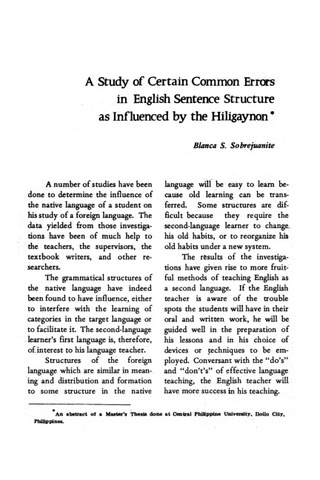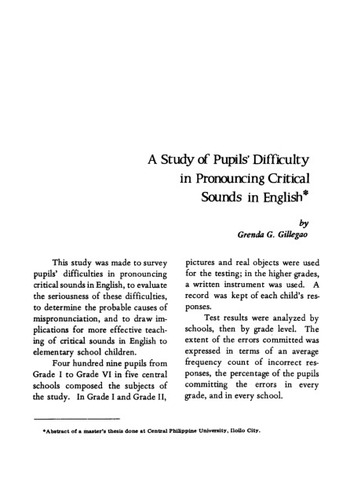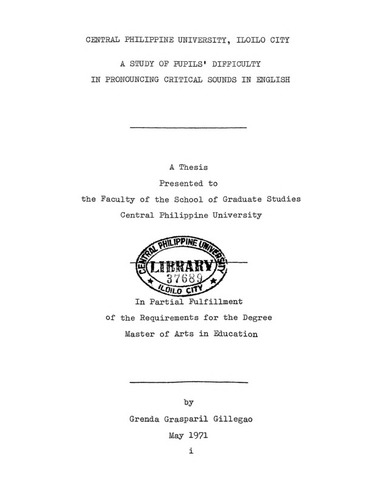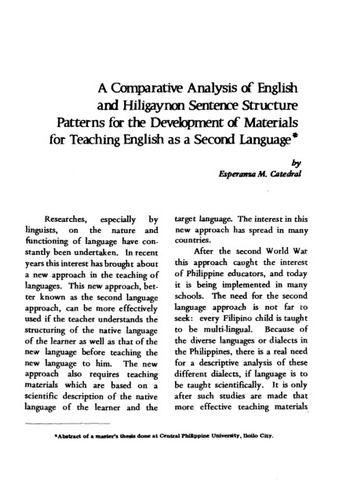Показать сокращенную информацию
A study of certain common errors in English sentence structure as influenced by the Hiligaynon
| dc.contributor.author | Sobrejuanite, Blanca S. | |
| dc.date.accessioned | 2022-07-12T00:21:56Z | |
| dc.date.available | 2022-07-12T00:21:56Z | |
| dc.date.issued | 1975 | |
| dc.identifier.citation | Sobrejuanite, B. S. (1975). A study of certain common errors in English sentence structure as influenced by the Hiligaynon. Southeast Asia Journal, 8(2), 18-22. | en_US |
| dc.identifier.issn | 0038-3600 | |
| dc.identifier.uri | https://hdl.handle.net/20.500.12852/2154 | |
| dc.description | Journal article | en_US |
| dc.description.abstract | A number of studies have been done to determine the influence of the native language of a student on his study of a foreign language. The data yielded from those investigations have been of much help to the teachers, the supervisors, the textbook writers, and other researchers. The grammatical structures of the native language have indeed been found to have influence, either to interfere with the learning of categories in the target language or to facilitate it. The second-language learner’s first language is, therefore, of. interest to his language teacher. Structures of the foreign language which are similar in meaning and distribution and formation to some structure in the native language will be easy to learn because old learning can be transferred. Some structures are difficult because they require the second-language learner to change his old habits, or to reorganize his old habits under a new system. The results of the investigations have given rise to more fruitful methods of teaching English as a second language. If the English teacher is aware of the trouble spots the students will have in their oral and written work, he will be guided well in the preparation of his lessons and in his choice of devices or techniques to be employed. Conversant with the “do’s” and “don’t’s” of effective language teaching, the English teacher will have more success in his teaching. | en_US |
| dc.language.iso | en | en_US |
| dc.publisher | Central Philippine University | en_US |
| dc.subject.lcsh | Hiligaynon language | en_US |
| dc.subject.lcsh | Hiligaynon language--Grammar | en_US |
| dc.subject.lcsh | English language | en_US |
| dc.subject.lcsh | English language--Grammar | en_US |
| dc.subject.lcsh | English language--Study and teaching--Foreign speakers | en_US |
| dc.subject.lcsh | English language--Errors of usage | en_US |
| dc.title | A study of certain common errors in English sentence structure as influenced by the Hiligaynon | en_US |
| dc.type | Article | en_US |
| dcterms.accessRights | Publicly accessible | en_US |
| dc.citation.firstpage | 18 | en_US |
| dc.citation.lastpage | 22 | en_US |
| dc.citation.journaltitle | Southeast Asia Journal | en_US |
| dc.citation.volume | 8 | en_US |
| dc.citation.issue | 2 | en_US |
| local.relation.associatedcontent | https://repository.cpu.edu.ph/handle/20.500.12852/1323 Unpublished Master's thesis | en_US |
Файлы в этом документе
Данный элемент включен в следующие коллекции
-
Southeast Asia Journal [188]





